 A man has 6 sons, each of whom is 4 years older than his next younger brother; and the eldest is three times as old as the youngest. What is the age of each 1 Prob. 43. Divide the number 49 into two such parts, that the greater increased by 6, shall be... A man has 6 sons, each of whom is 4 years older than his next younger brother; and the eldest is three times as old as the youngest. What is the age of each 1 Prob. 43. Divide the number 49 into two such parts, that the greater increased by 6, shall be...  A School Algebra - Page 42by George Albert Wentworth - 1890 - 495 pagesFull view A School Algebra - Page 42by George Albert Wentworth - 1890 - 495 pagesFull view - About this book
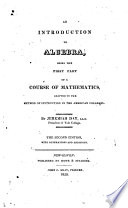 | Jeremiah Day - Algebra - 1820 - 352 pages
...hold ? Prob. 42. A man has 6 sons, each of whom is 4' years, older than his next younger brother ; and the eldest is three times as old as the youngest. What is the age of each ? Prob. 43. Divide the number 49 into two such parts, that the greater increased by 6, shall be to... | |
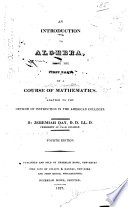 | Jeremiah Day - Algebra - 1827 - 352 pages
...hold ? Prob. 42. A man has 6 sons, each of whom is 4 years older than his next younger brother ; and the eldest is three times as old as the youngest. What is the age of each? Prob. 43. Divide the number 49 into two such parts, that the greater increased by 6, sHall be to the... | |
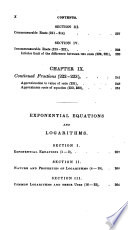 | Benjamin Peirce - Algebra - 1837 - 302 pages
...Ans. $160. 20. One has six sons, each whereof is 4 years older than his next younger brother ; and the eldest is three times as old as the youngest. What is the age of the eldest? Ans. 30 years. 21. There is a certain fish whose head is 9 inches; the tail is as long... | |
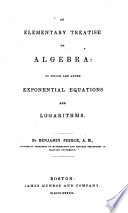 | Benjamin Peirce - Algebra - 1837 - 300 pages
...Ans. $160. 20. One has six sons, each whereof is 4 years older than his next younger brother ; and the eldest is three times as old as the youngest. What is the age of the eldest ? Ans. 30 years. 21. There is a certain fisli whose head is- 9 inches; the tail is as long... | |
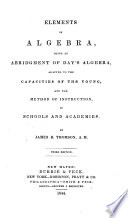 | James Bates Thomson - Algebra - 1844 - 266 pages
...hold t Prob. 42. A man has 6 sons, each of whom is 4 years older than his next younger brother; and the eldest is three times as old as the youngest. What is the age of each 1 Prob. 43. Divide the number 49 into two such parts, that the greater increased by 6, shall be to... | |
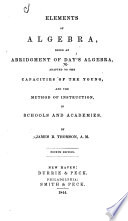 | James Bates Thomson - Algebra - 1844 - 272 pages
...hold 1 Prob. 42. A man has 6 sons, each of whom is 4 years older than his next younger brother ; and the eldest is three times as old as the youngest. What is the age of each1 Prob. 43. Divide the number 49 into two such parts, that the greater increased by 6, shall be... | |
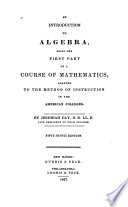 | Jeremiah Day - Algebra - 1847 - 358 pages
...hold 1 Prob. 42. A man has 6 sons, each of whom is 4 years older than his next younger brother; and the eldest is three times as old as the youngest. What is the age of each ? .Prob. 43. Divide the number 49 into two such parts, that the greater increased by 6, shall be to... | |
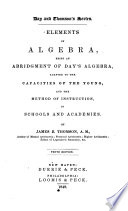 | Jeremiah Day, James Bates Thomson - Algebra - 1848 - 264 pages
...hold ? Prob. 42. A man has 6 sons, each of whom is 4 years older than his next younger brother; and the eldest is three times as old as the youngest. What is the age of each I Prob. 43. Divide the number 49 into two such parts, that the greater increased by 6, shall be to... | |
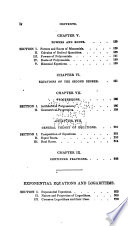 | Benjamin Peirce - Algebra - 1855 - 308 pages
.... Ans. 160. 20. One has six sons, each whereof is 4 years older than his next younger brother; and the eldest is three times as old as the youngest. What is the age of the eldest? Ans. 30 years. 21. There is a certain fish whose head is 9 inches ; the tail is as long... | |
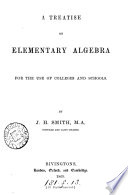 | James Hamblin Smith - 1869 - 412 pages
...father. What is the age of each ? 24. A man has six sons, each 4 years older than the one next to him. The eldest is three times as old as the youngest. What is the age of each ? 25. The difference between two numbers is 8, and the quotient resulting from the division of the... | |
| |